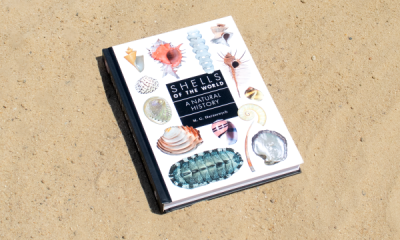Marine Life & Conservation
9 epic dive destinations for whale fans
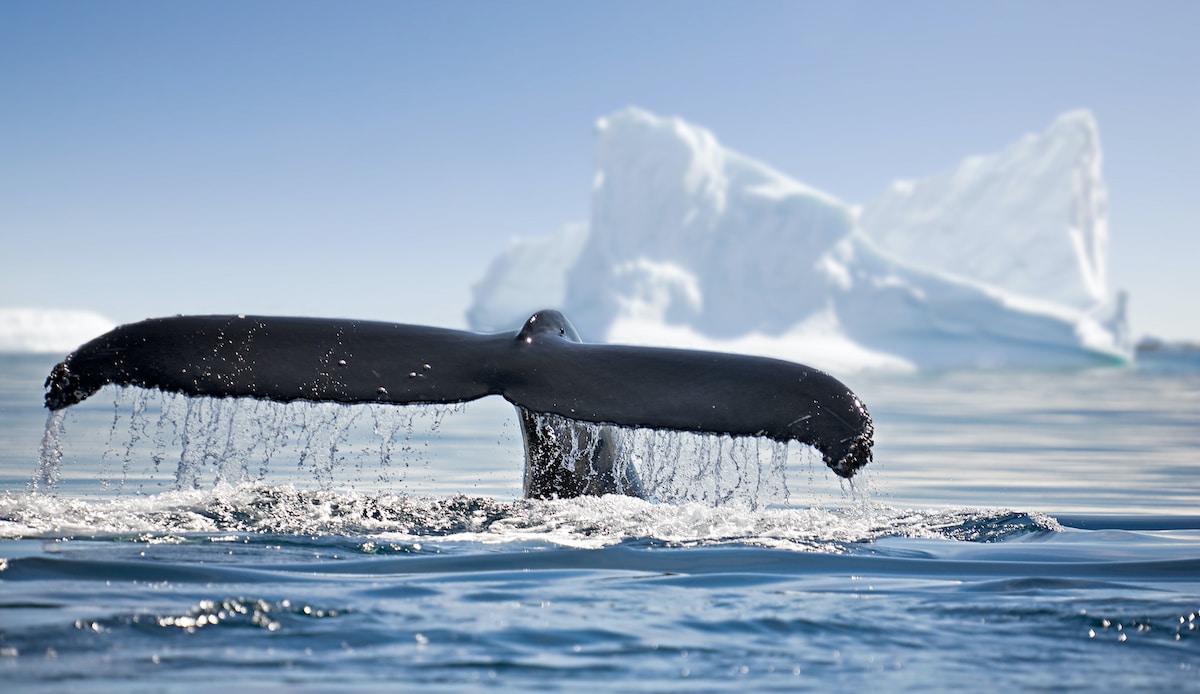
Whether you’re swimming with whales or watching them from a boat, there is something truly special about spending time with these ocean giants.
Thankfully there are a variety of dive destinations that offer whale swimming and above-water whale encounters you won’t want to miss.
Read our guide to the best dive destinations for whale fans to find out more.
1. Great Barrier Reef, Australia
For one of the lesser known yet incredible whale experiences, go Great Barrier Reef diving during the Australian winter.
Tens of thousands of whales migrate from Antarctica to the Great Barrier Reef during the winter months, including dwarf minke whales.
These 8 meter long whales are utterly charming and actively seek human contact, coming close to snorkelers in the water and making repeated passes.
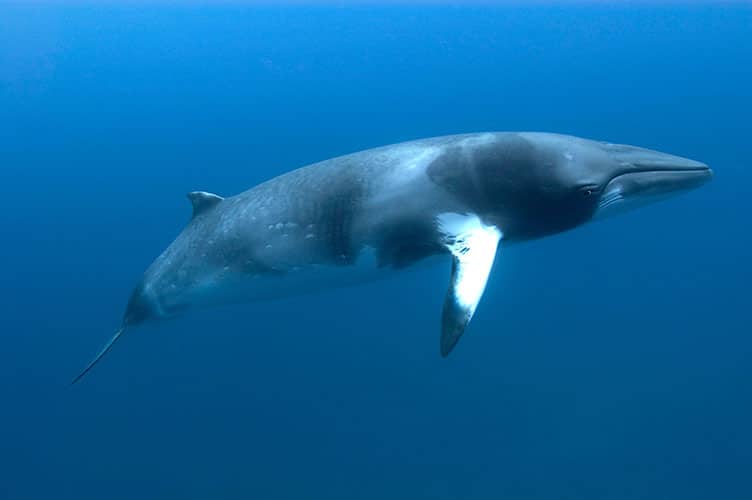
Photo: Ocean Quest liveaboard
You can see them whilst scuba diving but joining a minke whale safari is the best way to spend hours in the water with these whales.
The Ocean Quest liveaboard offers ‘meet the minke’ safaris during July each year.
2. Norway
The largest member of the dolphin family and toothed whales, orcas are easy to identify and a firm favourite with ocean fans around the world.
Hundreds of orcas gather off the coast of northern Norway during the Arctic winter to feast on migrating herring moving through the fjords and along the coastline.
Since they follow the herring, the orcas are relatively easy to find. You can join dedicated safaris with the Sula liveaboard to get in the water with the orcas as a snorkeler or free diver.
Just be prepared for typically cold Arctic winter conditions and chilly water!
You’ll be rewarded with a life-changing experience and a great chance of seeing the Northern Lights dance across the night skies.
3. Tonga
Tonga has some beautiful dive sites without any crowds but is best known for its clear blue waters and abundant humpback whales.
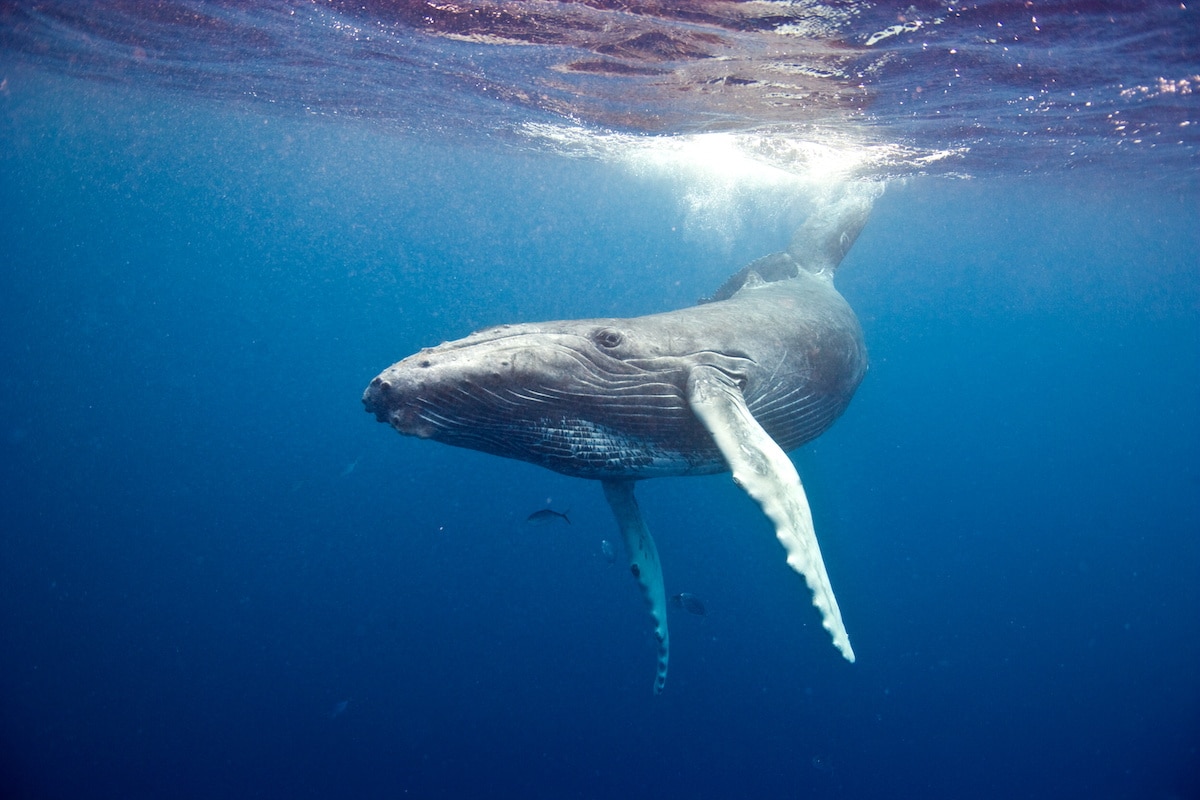
It is one of the best and most reliable places in the world to swim with humpback whales and their young. It’s also an idyllic destination for a far-flung adventure any time of year.
The Nai’i liveaboard is one of the few boats that offer liveaboard-based Tonga humpback whale swim safaris.
Just make sure you book early, as it’s extremely popular.
4. Dominican Republic
Silver Bank marine reserve in Dominican Republic is another great place for swimming with humpback whales.
The marine reserve provides a winter haven for the North Atlantic humpback population, where they gather to mate, calve and raise their young.
The Turks and Caicos Aggressor II offers safaris that focus solely on humpback whale swimming, typically from January to March each year.
5. Spitsbergen
If you’re visiting the Arctic during the summer months, you won’t be able to dive with orcas but you can go diving around Spitsbergen off Norway.
It’s a remote and wild destination where you can try ice diving, boat-based diving and even wreck diving.
The best dive sites are only accessible by Arctic liveaboard diving and you’ll find plenty of life underwater, including sea snails, sea butterflies, crabs, fish, sea lions and more.
While you’re there you can spot minke, fin, humpback and blue whales, plus walruses, Arctic foxes, bearded seals and an array of birds.
6. Hawaii
The Hawaiian chain of volcanic islands offers a good mixture of dive options, including wrecks, caves, healthy reefs and drift dives.
All accompanied by lush coral gardens and striking lava landscapes, plus marine life you won’t find anywhere else on Earth.
If you dive there during November to May, you also have the chance to watch Hawaii’s humpback whales as they migrate through the area.
Keep your eyes on the blue if you’re diving off Oahu during September to December, as that’s also tiger shark season.
7. Ningaloo Reef, Western Australia
If you’ve not yet dived Western Australia, add it to your wish list.
Quieter than the Great Barrier Reef, western Australia offers an array of dive opportunities and plenty of marine megafauna.
The UNESCO-listed Ningaloo Coast supports an abundance of marine life including humpback whales from July to November.
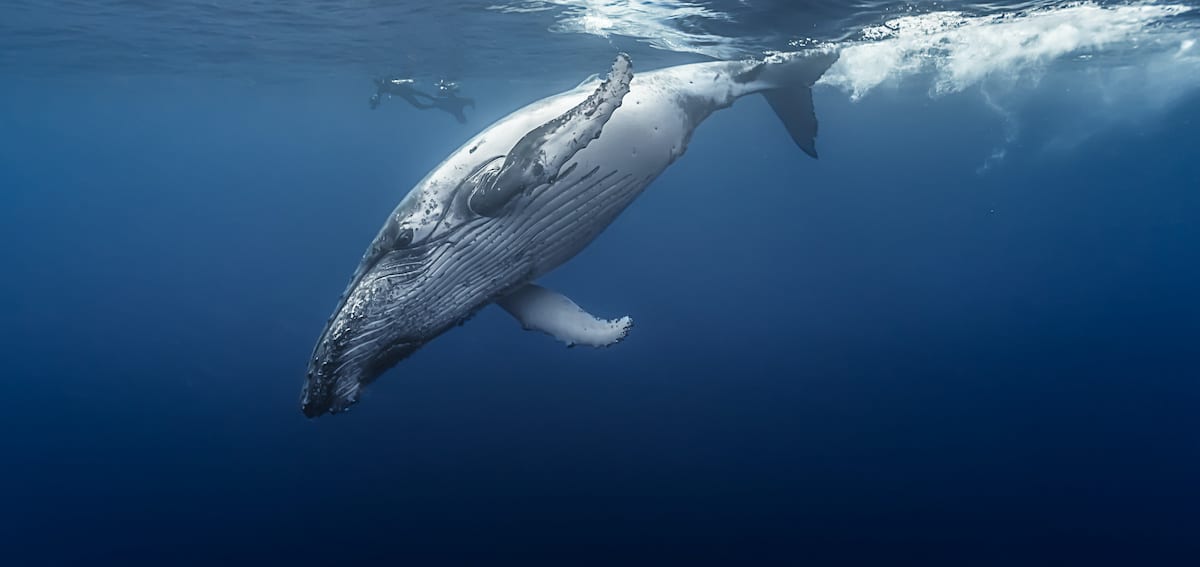
Thousands of these whales migrate through Ningaloo Reef each year, where you can go swimming with them or enjoy their mating displays from the comfort of your boat.
8. Mexico
The Cabo Pulmo marine park, the Socorro Islands and the Sea of Cortez all offer spectacular Mexico scuba diving and whale watching.
These megafauna hotspots offer encounters with many whale species; including blue whales, grey whales and humpbacks, plus giant mantas, dolphins and sea lions.
If you’re looking to encounter blue whales, head to Baja California between February and March.
For grey whales, visit from January to mid-March. The Socorro Islands host humpback whales during the winter season until April.
9. Antarctica
For a truly remote adventure and whale watching experience, join an Antarctic liveaboard diving expedition.
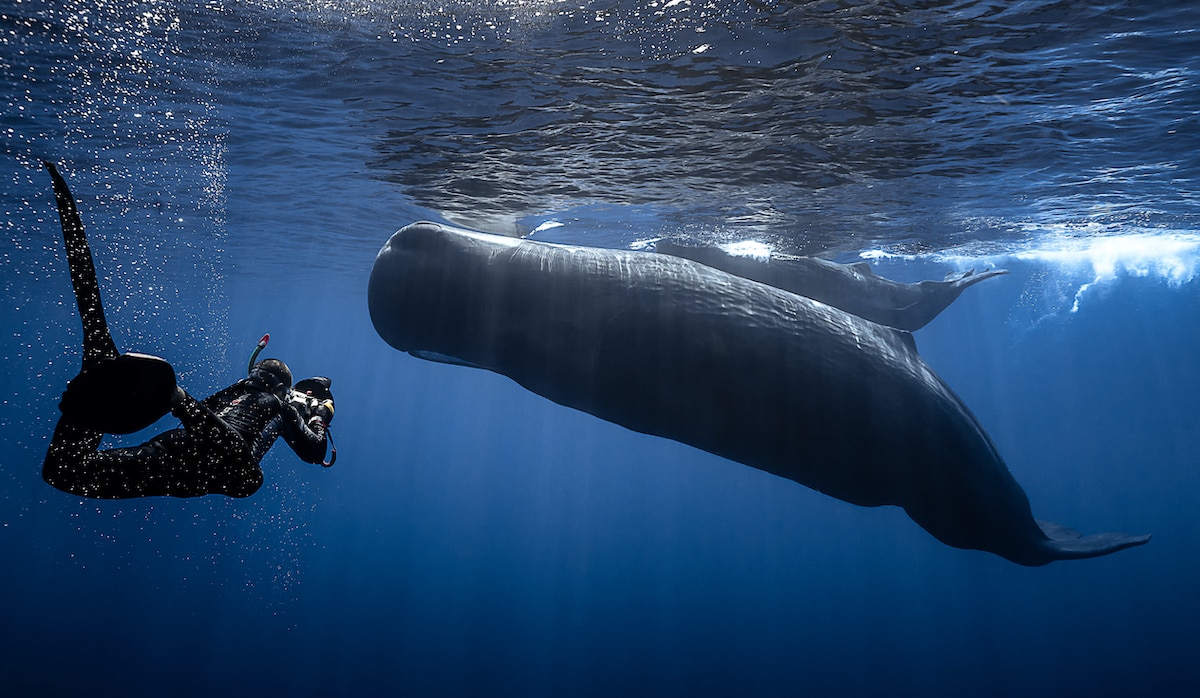
As one of the world’s last wilderness areas, it is busy with life including around 15 whale species.
Go diving there and you have a chance to dive Antarctica and immerse yourself in snow and ice-covered landscapes.
You may also see blue, fin, humpback, minke, sei, southern right and sperm whales during your expedition.
 This article was written by divers and writers at LiveAboard.com
This article was written by divers and writers at LiveAboard.com
Blogs
The Ocean Cleanup Breaks 10,000,000 KG Barrier

The Ocean Cleanup, the global non-profit project, has removed a verified all-time total of ten million kilograms (22 million lbs.) of trash from oceans and rivers around the world – approximately the same weight as the Eiffel Tower.
To complete its mission of ridding the oceans of plastic, The Ocean Cleanup uses a dual strategy: cleaning up the Great Pacific Garbage Patch (GPGP) to remove the plastic already afloat in the oceans, while stopping the flow of plastic from the world’s most polluting rivers.
Through cleaning operations in the GPGP and in rivers in eight countries, the cumulative total of trash removed has now surpassed ten million kilograms. This milestone demonstrates the acceleration of The Ocean Cleanup’s impact, while underlining the astonishing scale of the plastic pollution problem and the need for continued support and action.
While encouraging for the mission, this milestone is only a staging point: millions more tons of plastic still pollute our oceans and The Ocean Cleanup intends to continue learning, improving and innovating to solve this global catastrophe.
This announcement comes as governments from around the world meet to continue negotiations to develop a new legally binding instrument to end plastic pollution at INC4 in Ottawa, Canada. Representatives of The Ocean Cleanup will be in attendance and the organization will be urging decision-makers to collaborate towards a comprehensive and ambitious global treaty which addresses plastic at all stages of its life cycle and in all marine environments worldwide, including in areas beyond national jurisdiction.
It is encouraging to see that the need for remediation is reflected in the various options for potential treaty provisions. It is essential that the final treaty contains clear targets for the remediation of legacy plastic pollution, and reduction of riverine plastic emissions.
Tackling plastic pollution requires innovative and impactful solutions. The treaty should therefore incentivize the innovation ecosystem by fostering innovations that make maximal use of data, technology and scientific knowledge – such as those designed and deployed by The Ocean Cleanup.
‘After many tough years of trial and error, it’s amazing to see our work is starting to pay off – and I am proud of the team who has brought us to this point.’ said Boyan Slat, Founder and CEO of The Ocean Cleanup. ‘While we still have a long way to go, our recent successes fill us with renewed confidence that the oceans can be cleaned.’
The Ocean Cleanup was founded in 2013 and captured its first plastic in 2019, with the first confirmed catch in the GPGP coming soon after the deployment of Interceptor 001 in Jakarta, Indonesia. After surpassing one million kilograms of trash removed in early 2022, the non-profit project has since progressed to the third iteration of its GPGP cleaning solution, known as System 03, and a network of Interceptors currently covering rivers in eight countries, with more deployments set for 2024.
About The Ocean Cleanup
The Ocean Cleanup is an international non-profit organization that develops and scales technologies to rid the world’s oceans of plastic. They aim to achieve this goal through a dual strategy: stemming the inflow via rivers and cleaning up the legacy plastic that has already accumulated in the ocean. For the latter, The Ocean Cleanup develops large-scale systems to efficiently concentrate the plastic for periodic removal. This plastic is tracked and traced through DNV’s chain of custody model to certify claims of origin when recycling it into new products. To curb the tide via rivers, The Ocean Cleanup has developed Interceptor™ solutions to halt and extract riverine plastic before it reaches the ocean. Founded in 2013 by Boyan Slat, The Ocean Cleanup now employs a broadly multi-disciplined team of approximately 140. The foundation is headquartered in Rotterdam, the Netherlands.
For more information, visit: theoceancleanup.com and follow @theoceancleanup on social media.
Marine Life & Conservation
Steve Backshall to headline Shark Trust’s flagship event: For the Love of Sharks

Join a host of amazing, shark loving, speakers including Steve Backshall and the Shark Trust team for an evening celebrating shark conservation at the Royal Geographical Society in London this November.
Date: 29th November 2024
Time: 6-10pm
Location: Royal Geographical Society, London
Tickets: https://www.sharktrust.org/Event/flos24
The event will be a celebration of all things shark. Those lucky enough to get hold of tickets will hear from engaging guest speakers with a passion for sharks.
The line-up includes (*subject to change if unforeseen circumstances arise)
Steve Backshall: One of television’s busiest presenters, BAFTA award-winning wildlife expert Steve has been passionate about the wild world ever since he was young.
Steve’s impressive TV career has taken him all around the world, investigating a wide array of species and environments. Steve has filmed over 100 hours of children’s wildlife programmes with the BAFTA award winning Deadly 60 franchise and recently, with Sky Nature, for his new series ‘Whale with Steve Backshall’. He has been a patron for the Shark Trust for 10 years.
Simon Rogerson: is a photojournalist specialising in natural history, diving and the sea.
He is editor of SCUBA magazine, the official journal of the British Sub-Aqua Club. Simon started his career as a crime reporter but gravitated towards his ‘less depressing’ interest in underwater exploration, joining the staff of DIVE magazine in 1999. In 2005 he was named ‘Editor of the Year’ in the PPA’s Independent Publishing Awards. Simon also works as a freelance writer, contributing frequently to the Sunday Times and Telegraph, in addition to BBC Wildlife, Esquire, and a host of international diving magazines. He is the author of a book, Dive Red Sea, published by Ultimate Sports. Now based in Berkshire, Simon has been a Patron of the Shark Trust for 20 years.
More speakers to be announced soon. Head to the Shark Trust website to learn more.
The evening will also allow guests the final chance to see the Oceanic 31, shark art exhibition. Some of the artwork will be auctioned/raffled at the event, while the rest will be auctioned online to raise money for the Shark Trust Oceanic Programme.
For the Love of Sharks is an evening with something for everyone who is interested and fascinated by sharks. Join the Shark Trust, their Patrons, Trustees and Staff, along with a host of supporters for this celebration of shark conservation.
For more information or to buy a ticket: https://www.sharktrust.org/Event/flos24
-

 News3 months ago
News3 months agoCapturing Critters in Lembeh Underwater Photography Workshop 2024: Event Roundup
-

 Marine Life & Conservation Blogs3 months ago
Marine Life & Conservation Blogs3 months agoCreature Feature: Swell Sharks
-

 Gear Reviews4 weeks ago
Gear Reviews4 weeks agoGEAR REVIEW – Revolutionising Diving Comfort: The Sharkskin T2 Chillproof Suit
-

 Blogs2 months ago
Blogs2 months agoMurex Resorts: Passport to Paradise!
-

 Blogs3 months ago
Blogs3 months agoDiver Discovering Whale Skeletons Beneath Ice Judged World’s Best Underwater Photograph
-

 News3 months ago
News3 months agoPADI Teams Up with Wellness Brand Neuro to Drive Ocean Change and Create a Blue State of Mind
-

 Gear Reviews3 months ago
Gear Reviews3 months agoGear Review: Oceanic+ Dive Housing for iPhone
-

 Marine Life & Conservation2 months ago
Marine Life & Conservation2 months agoSave the Manatee Club launches brand new webcams at Silver Springs State Park, Florida



